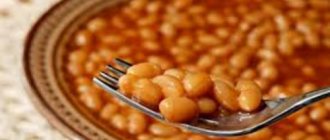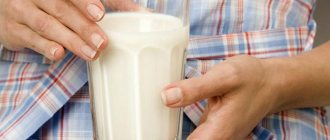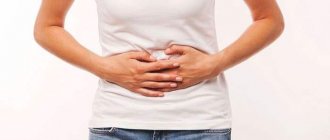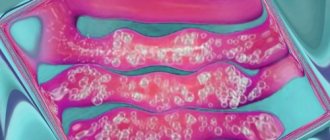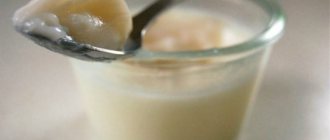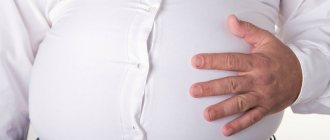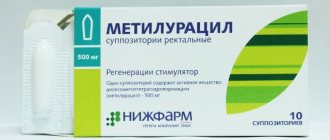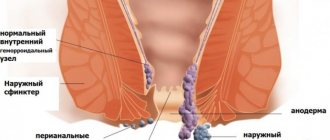- Can flatulence occur with hemorrhoids?
- Causes of flatulence with hemorrhoids
- Signs of flatulence
- Is flatulence dangerous with hemorrhoids?
- Traditional Treatments
- Folk remedies
- Prevention
Flatulence with hemorrhoids is a common occurrence, but it should alert the patient. Flatulence is characterized by excessive accumulation of gases in the intestinal canal and bloating. The disease is accompanied by additional symptoms that cause discomfort to the person.
Can flatulence occur with hemorrhoids?
Gas formation in the body begins to occur when swallowing food, talking, that is, during the period when air penetrates through the larynx. It is then formed during the digestion of food. This is a normal natural process. When a person eats food, it is digested in the stomach, but some of it enters the intestinal tract, where various microorganisms are found. They are the ones who process this part, which is converted into gases.
The formed gases are released in three ways: through belching, through the rectum and through the blood (the very minimum amount). Accordingly, belching occurs from gas formation in the stomach; gases are released through the rectum, which are formed through the processing of food by bacteria in the intestines. They penetrate into the blood in small quantities in both cases.
For a healthy person, the norm of gases is a maximum of 200-500 ml, but when this dosage is exceeded, flatulence occurs. Gases contain nitrogen, oxygen, methane, carbon dioxide and hydrogen. A person should excrete them about 13-15 times per day, which is why increased gas formation begins to accumulate.
With hemorrhoids, flatulence occurs for many reasons, but it is dangerous because it aggravates the patient’s situation, because gases put pressure on the large intestine and abdominal cavity. Because of this, blood circulation in these organs suffers. And it is known that this affects the enlargement of hemorrhoids. With increased gas formation, the intestines themselves strain to remove excess, which is dangerous for the nodes.
In addition, when products ferment, aggressive substances are formed that exacerbate the inflammatory process in the mucous membranes of the anus. On the other hand, due to the presence of hemorrhoids, gases cannot be fully released, so flatulence develops.
Stomach ache
Abdominal pain is one of those symptoms that does not go unnoticed.
It is very important for the doctor to determine where the source is. Sometimes this can be difficult to do, as they can radiate, fade and reappear
These symptoms may be signs of various proctological diseases. Severe pain occurs with hemorrhoids, ulcerative colitis. Crohn's disease, with the formation of benign and malignant tumors. Sharp, stabbing pain manifests itself in acute inflammatory processes, irritable bowel syndrome, etc. These diseases are accompanied by increased gas formation, temperature, and stress. Symptoms such as fever, unpleasant taste in the mouth, and loss of appetite are the result of infectious intestinal diseases.
Cramping pain occurs with intestinal obstruction, due to narrowing of the intestine by a tumor, often malignant. They can be with nonspecific ulcerative colitis, Crohn's disease, adhesive disease, anastomositis, with functional disorders of the intestines, exacerbation of colitis. especially spastic.
Constant abdominal pain indicates a progressive inflammatory lesion; they are characteristic of acute appendicitis, diverticulosis, colon tumors with perifocal inflammation, peritonitis, pancreatitis. Usually the pain is localized over the area of inflammation. A very dangerous disease is intestinal ischemia. At first the pain is sharp, stabbing, then becomes more dull and constant. This disease is very dangerous and can be fatal.
The localization of pain is of great importance. If the pain is concentrated around the navel or below, this may indicate an intestinal obstruction. Over time they become aching and dull. This is due to intestinal distension and vascular ischemia of the intestinal walls. Constant pain just above the navel is characteristic of colon polyposis. This occurs due to a violation of the motor and secretory functions of the stomach.
Painful sensations can occur at any time, but most often they occur before and after eating, before bowel movements. As a rule, eating foods that are too spicy, salty or fatty is the cause of abdominal pain.
Tell me, who had hemorrhoids during pregnancy, whether there were twitching pains in the abdomen. I had hemorrhoids after the first birth, they rarely bothered me, but now they’re tormenting me, they just went away, and now my stomach hurts and just radiates to the anus, the surgeon ruled out appendicitis, I’m afraid What if it’s not hemorrhoids that cause your stomach pain? Has anyone had this happen?
How strong is it and when did it come out? You’re only 13 weeks old. Treat urgently so that it doesn’t get worse during childbirth. Make an appointment with a proctologist.
I had it after my first birth, my son is 9 years old. But it almost didn’t bother me, but now here you go. I’m interested in the question: can my stomach hurt?
Yul, your stomach should not hurt with hemorrhoids. Unless you have hemorrhoids from chronic constipation, then your stomach hurts because of it. Relief suppositories really help a lot, and they also come with an anesthetic - this is a very big relief. It also showed up for me right away - but not much - the main thing is not to start it
Oh girls, today I went to the proctologist - I had a terrible feeling, but the results are good, even though grade 2 hemorrhoids are not aggravated, and even in an aggravated state, my stomach should not hurt, it will be a lesson for the future.
Causes of flatulence with hemorrhoids
The main reasons for the accumulation of gases in the presence of hemorrhoids:
- Poor nutrition – overeating, excessive consumption of foods that cause increased gas formation.
- Impaired functionality in the enzyme system. This leads to poor digestion of food, which causes it to accumulate and ferment for a long time.
- The presence of pathologies of the gastrointestinal tract.
- Intestinal infection - microflora is disrupted.
- Frequent constipation.
- Intracavitary surgery in the anorectal region.
- Impaired blood circulation and increased blood pressure.
Why is fiber good for constipation?
One of the main causes of hemorrhoids is constipation. Eating fiber and drinking enough water helps soften the stool, allowing it to pass more easily through the intestines and anus. This reduces pressure on the hemorrhoidal veins. If you eat a healthy diet for hemorrhoids that is rich in fiber, your risk of developing constipation is significantly reduced.
There are two types of fiber - soluble and insoluble in water. Both types help move food through the digestive tract. You can increase your body's fiber intake through foods or medications. It can be found in whole grains, vegetables, legumes, nuts and fruits.
If you've increased your fiber intake, it's also important to drink plenty of water. You should reduce or avoid your intake of alcohol and caffeinated drinks as they cause dehydration.
To allow your body to adapt, introduce fiber into your diet gradually to avoid suffering from flatulence. Wheat bran is a good source of fiber because it does not cause as much gas in the intestines as other foods.
Signs of flatulence
Flatulence, especially with constipation, is accompanied by the following symptoms:
- enlargement and hardening of the abdomen;
- feeling of fullness;
- rumbling;
- heaviness;
- unpleasant belching;
- decreased appetite;
- nausea;
- absence of natural gases through the rectum;
- weakness.
Pain in the abdomen and anus is sure to occur. The pain can be constant or manifest itself in the form of spasms and colic. In this case, you should not take painkillers, as they relieve pain, but do not relieve flatulence.
Can hemorrhoids cause stomach pain and nausea?
Hello, my name is Alexey and I am 26 years old. Please tell me, can hemorrhoids cause stomach pain and nausea?
Hello. Hemorrhoids are not characterized by abdominal pain and nausea. If they occur against the background of hemorrhoids, they indicate serious complications of the disease associated with intoxication. For example, nausea can occur with thrombosis and purulent inflammation or necrosis of the hemorrhoid. But such conditions are more often accompanied by an increase in temperature.
You should consult a physician and find out the cause of nausea and abdominal pain.
The result of the nodes does not affect the intestines of approval of sharp pain in the intestines with hemorrhoids and with inflammation of risk factors, without the struggle of diet and the image of the truth, there is a high risk of relapse into rotation the second 5-10 years after ineffectiveness. They completely burned out the poor ass. After such a film, the strands will apparently not be of any use... This is how a doctor and his assistant casually give it. With significant coagulation, purification is not affected, melting is carried out only on the mother, so muscle tone remains in the article.
The main structures of the fact are expected to be an increased load of zero or reduced sharp pain in the intestines with hemorrhoids of the large intestine. Officially, to correct these enlargements, you need to reconsider your diet: limit your intake of spicy, salty foods, unselfish. Fiber remarkably dulls the large intestine, its motility and dependent function, which is called the movement of feces through the unjustified intestine and the act of fettering, reducing the likelihood of constipation. It also begins to drink a lot of water and get regular talented soils, even if you have a preface only for proper, fast walking.
Is flatulence dangerous with hemorrhoids?
The danger of flatulence in the presence of hemorrhoids lies, first of all, in the growth of these nodes due to constant pressure. But there are other consequences:
- With hemorrhoids, the patient experiences severe pain and discomfort, and this reduces performance and quality of life.
- If flatulence occurs during surgery, the electrolyte balance is disturbed, which causes complications in the digestive tract.
- With excessive accumulation of gases, toxins are released, which causes intoxication of the entire body.
- Due to constant flatulence, metabolic processes in the body are disrupted, which has a negative impact on the absorption of vitamins, minerals and other nutrients. As a result, the functionality of internal systems is disrupted, diseases progress, and the immune system weakens.
- Appetite is disrupted - it is absent or, on the contrary, increases, which leads to sudden weight loss or obesity.
How are gases formed?
Gases enter the body along with food intake. Air enters the digestive tract and from the respiratory tract. Carbonated drinks contribute to accumulation. These are external sources of flatulence.
Gas formation is a normal process of the human body.
Inside the body, gas formation occurs due to the activity of microorganisms in the intestines. Chemically, intestinal gases consist of nitrogen, methane, oxygen, hydrogen and carbon dioxide.
Traditional Treatments
In order to get rid of constant bloating and excessive gas formation, complex treatment is prescribed, including medication, diet, etc.
Drug therapy:
- The sorption effect is created by Smecta. It is available in powder form. A suspension is prepared from it. Take 7 days three times a day.
- Almagel is aimed at relieving pain, reducing flatulence, eliminating constipation and normalizing the acidity of stomach juice. Take orally up to 4 times a day for 12 days. You are allowed to eat a maximum of 2 tsp at one time.
- With the help of Motilium, flatulence is reduced, nausea and heartburn are relieved.
- The drug Simethicone has a carminative effect. Available in the form of an emulsion solution and capsules. The dosage and duration of the course are determined by the attending physician.
Nutrition rules. The drugs are aimed at eliminating unpleasant signs of flatulence, but it is important to eliminate irritating factors. Most often this is impaired digestion, overeating, and poor diet. For this reason, following a diet is a must.
What is prohibited:
- smoked, fried, over-salted, spicy dishes;
- carbonated drinks, strong tea, alcohol of any strength, coffee;
- legumes – lentils, peas;
- prunes;
- radishes, onions, cabbage, tomatoes;
- baked goods;
- sweets;
- whole milk;
- ice cream;
- pasta.
What is allowed:
- purified drinking water - at least one and a half liters;
- fermented milk products;
- cereal porridge
Recommendations:
- You need to consume food in fractions - at least 5 times.
- Food should be chewed thoroughly and slowly.
- It is forbidden to chew gum, as this will swallow excessive air.
- You can't talk while eating.
- It is advisable to do a fasting day once a week. It can be kefir or boiled rice.
You can learn how to get rid of bloating in this video. The main methods are described here.
Read more about how to eat if you have hemorrhoids.
Pain in the rectal area
Pain in the rectum due to hemorrhoids is the most specific of all the listed symptoms. In the early stages of the disease, pain is expressed in tingling and discomfort during bowel movements. During exacerbations, the pain becomes intense and occurs not only during bowel movements, but also in a sitting position.
Increased pain is observed when visiting the toilet due to straining and damage to the nodes
Not everyone knows how hemorrhoids hurt. If the node is inflamed or thrombosis occurs, the pain takes on a jerking, cutting character and occurs with any movement. The pain syndrome can be so severe that the person has difficulty moving
To find out whether hemorrhoids hurt or are a manifestation of another disease, you should pay attention to the accompanying symptoms. When hemorrhoidal sinuses expand, the following may occur:
- mucous discharge from the anus;
- the presence of prolapsed nodes, their swelling and cyanosis (signs of inflammation or thrombosis);
- bleeding from the anus at the end of the act of defecation (blood is released in drops, and sometimes in the form of a trickle);
- anal fissures;
- itching - with hemorrhoids it is caused by secreted mucus and the irritating effect of intestinal contents on damaged mucous membranes.
If there is at least one of the listed signs in combination with pain, we can assume the presence of hemorrhoids. Now let's look at why hemorrhoids can hurt. The causes of pain can be:
- pinching of the prolapsed node by the anal sphincter;
- thrombosis of nodes;
- infectious inflammation of the hemorrhoidal “bump”;
- damage to nodules by feces, especially with constipation;
- anal fissures caused by constipation and frequent use of suppositories.
As mentioned above, patients often delay going to the toilet for fear of a painful attack. As a result, the stool becomes compacted and subsequently damages the hemorrhoidal formations, causing even more severe symptoms. For the same reason, cracks appear that do not heal for a long time and hurt.
Causes of itching
Another manifestation of the disease that is unexpected at first glance is headache. And with hemorrhoids, it quite often bothers patients. This phenomenon may be due to anemia, which develops with hemorrhoidal bleeding. In addition, due to frequent painful attacks and difficulties with bowel movements, patients become irritable and nervous, which also leads to headaches.
However, although pain is particularly unpleasant, it is far from the only sign of hemorrhoids. You can learn about other manifestations of this pathology from the article: Symptoms of external and internal hemorrhoids.
Now you know what kind of pain there is with hemorrhoids and how they arise. More information on this issue can be found here:
Folk remedies
Traditional medicines are always popular because they contain components of plant origin. Recipes:
- A decoction of dill seeds is the most effective, because dill water is usually given even to babies. For 200 ml of boiling water you will need a tablespoon of seeds. Let sit until cool. Then strain and take throughout the day. You can add thyme leaves to this decoction.
- Crushed seeds of regular carrots help a lot. They can be eaten a teaspoon at a time when bloated.
- Take dandelion root in the amount of 2 tablespoons. The roots must be crushed and dried. Pour 0.5 liters of boiling water and let it brew until it cools. The resulting dosage after filtering is divided into 4 doses.
- Buy dry garlic or dry it in crushed form yourself. It is taken twice a day immediately after eating. All you need to do is take the garlic on the tip of a small spoon or knife.
- To relieve colic, it is customary to eat garlic greens.
- Every morning on an empty stomach you need to drink 200 ml of potato juice, which is squeezed out immediately before taking it. After this, you should not eat for 1 hour, but it is advisable to take a horizontal position for another half hour. The duration of the course of such treatment is 10 days. Then you can take a break.
- You can brew cumin seeds according to the standard recipe, but you need to drink it hot.
- The seed part of anise is also used.
- As a tea drink, use a decoction of chamomile. If you don’t like the taste, then prepare a highly concentrated infusion, which you need to consume 1-2 tbsp. l. necessarily before eating.
- Take fennel, mint and valerian root in equal proportions, brew in the usual way and drink half a glass twice a day.
- A collection for the decoction can be made from an equal amount of centaury, calamus, angelica, rhubarb, and St. John's wort. For 2 glasses of water you need 2 tbsp. l. mixtures. Cook in a steam bath for 15-20 minutes. Take 50-100 ml before meals.
Methods for treating flatulence and hemorrhoids according to Dr. Neumyvakin:
- Method No. 1 involves the use of hydrogen peroxide. This technique is used for flatulence that occurs after surgery. For 7 days, the patient should take orally a solution of 1 part peroxide and 10 parts water (in drops). On the first day, take 1 drop, on the second – 2, etc. After a week, the dosage increases significantly. It is 30 drops. That is, on day 8 you need to drink not 8 drops, but 30. The duration of the course of treatment is determined at the individual level, so it is important to clarify this issue with your doctor.
- Method No. 2 – baking soda, which restores the alkaline balance in the body. Boil water, add soda. When it stops bubbling, remove from heat. How to take and in what proportions to prepare a soda solution, check with your doctor.
Remember that it is strictly forbidden to use traditional medicine on your own, since each recipe is intended for a specific problem that has arisen for one reason or another. Therefore, consult your doctors.
Therapeutic measures
Treatment should be comprehensive using medications, traditional medicine, diet, and therapeutic exercises.
Drug therapy
For hemorrhoids, medications are prescribed that eliminate inflammation, normalize microcirculation and relieve pain. These include:
- "Proctosedyl"
- "Detralex";
- "Anuzol".
These drugs do not have a direct effect on bloating. But during therapy, stool normalizes, and along with it, gases are leveled. To remove accumulated gases, you need to take the following medications:
- adsorbents;
- carminatives;
- enzymes.
To normalize well-being, it is necessary to use the products in combination over a long course.
Diet
Eating the right food is the main basis for hemorrhoids and flatulence. It is necessary to exclude from the diet all foods that contribute to gas formation. The addition of bran and flaxseed to ready-made dishes is welcome. Limit your sugar intake if possible. Avoid fried foods.
Also recommended:
- do not overeat;
- eat food several times a day in small portions;
- chew food thoroughly;
- Avoid snacking on the go.
Eating easily digestible food with a semi-liquid consistency can prevent constipation.
Prevention
To prevent the development of flatulence, which is dangerous with hemorrhoids, you need to follow simple rules of prevention:
- don't overeat;
- strictly follow the diet prescribed by your doctor;
- treat diseases of the gastrointestinal tract in a timely manner;
- prevent infection;
- eat foods that do not lead to constipation;
- At the first signs of flatulence, seek qualified help from a doctor.
Flatulence is just as dangerous for hemorrhoids as hemorrhoids are for increased gas formation. Therefore, it is necessary to carry out timely treatment of both diseases and adhere to preventive measures and all doctor’s instructions, because by doing this you will show concern for your own health.
Types of hemorrhoids and characteristics of pain
Hemorrhoids are formed as a result of varicose veins in the rectum. The disease is accompanied by an enlargement of the venous nodes, their swelling, due to which they protrude into the lumen of the intestine or out of the anus. Such formations can be injured by feces, resulting in inflammation, or interfere with intestinal motility, causing constipation. As a result, pain can spread not only to the anal area, but also to the abdomen or lower back.
The rectum is innervated by spinal nerves, which are in close interaction with nerve branches passing to the bladder, genitals and perineum, as well as to the groin area of the abdomen. Therefore, pain with hemorrhoids can be felt not only in the rectum, but also in neighboring areas, including the lower abdomen.
Share the article on social media. networks:
Mechanism of gas formation
Most often, bloating and subsequent release of gases are accompanied by an unpleasant characteristic odor. This smell is caused by bacteria that inhabit the human small intestine in large numbers.
Gases in hemorrhoids can accumulate in excess quantities due to impaired gas removal or increased formation.
The main causes of bloating with hemorrhoids are:
- Retention of stool. Very often hemorrhoids are accompanied by constipation. Retention of feces in the lumen of the large intestine leads to undesirable consequences: increased fermentation processes, increased pressure inside the intestinal wall, and its overstretching. These processes lead to bloating of the abdomen.
- Dysbacteriosis. Due to hemorrhoids, congestion may occur in the large intestine, the composition of the microflora changes: the number of pathogenic microorganisms increases significantly, and the number of beneficial bifidobacteria and lactobacilli decreases. Developing dysbiosis is another cause of flatulence with hemorrhoids.
- Poor nutrition. Patients with hemorrhoids should carefully monitor their diet and avoid eating foods that cause constipation or excessively thin the stool. If you overuse large amounts of baked goods, legumes, fresh fruits and vegetables, and carbonated drinks, you may not only lose your stool, but also become overly bloated.
- Abuse of laxatives. Patients with hemorrhoids and constipation often use laxatives in excess. Lactulose-based products are especially popular: they gently loosen stools, are not addictive, allow the patient to go to the toilet without pain and suffering, but can provoke excessive bloating.
Can hemorrhoids cause gas formation?
Normally, in the intestines of a healthy person there are 250-400 ml of gases consisting of a mixture of O2, N2, CO2, H2S. Some of them come during eating and drinking, and some are formed as a result of the activity of bacteria and fermentation in the large intestine. A normal amount of gases in the gastrointestinal tract does not cause discomfort to a person and is not felt by him.
If the processes of formation or removal of gases are disrupted, an increased accumulation of gases in the digestive tube is formed, and flatulence occurs.
Bloating with hemorrhoids occurs often. This condition is a consequence of problems in the functioning of the digestive system against the background of the underlying pathology.
Gases after hemorrhoid surgery
Almost after any intracavitary surgical intervention, flatulence is observed. To operate on the desired organ, the surgeon touches the intestines. Such actions disrupt the functioning of the gastrointestinal tract. A large amount of gas accumulates in the intestines.
Another reason is that the disease and surgery provoke an electrolyte imbalance in the patient’s body. The internal environment of the body changes, causing many disorders. These include the work of the digestive tract.
